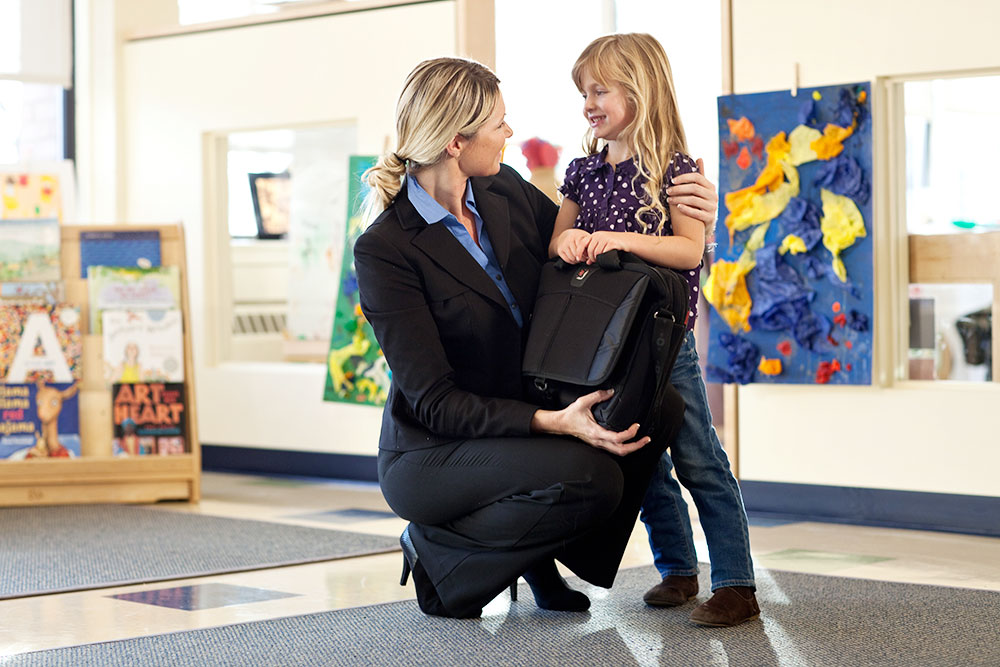This past Saturday was World Alzheimer’s Day, reminding us of the many people caring for elders. These responsibilities affect both their personal and work lives. The following is one Bright Horizons employee's story...
I am officially part of the sandwich generation.
This became apparent when my husband and I decided to move my father-in-law into our home with our two children. In truth, it was an easy decision. Alzheimer's disease had taken its toll on him at a slow and irregular pace. In the early years there were enough completely normal, lucid days that it was easy for all of us to just believe he was suffering the garden-variety memory loss associated with aging (some members of his family believe that to this day).
But slowly the incidents of extended confusion, of calling the police to report money stolen (which he had put in the bank himself on the previous day) had started to increase. It upended our universes and we knew we needed to make some new choices.
With help, we eventually found our dream team of caregivers and moved dad and his providers in with us. We were fortunate to have a large house in which we could create a separate area for him, and provide comfortable accommodation for his now full-time caregiver. We held our breath on move-in day as we waited for him to object to his new situation. But with his familiar furniture and pictures in place, he never questioned whether this was home. In fact, the move unfolded infinitely better than we could have imagined.
But there's still a toll exacted on our family. Adding additional family members has challenged our already over-packed universe. And when our regular caregivers are unavailable—when one of their family members is sick, for example, and we need a stand-in, we feel the acute stress of having a stranger in our private sphere...someone who makes food in our kitchen, sees our grumpy sides, or puts the ice cream scoop in an odd location. And after two years, the strain is beginning to show.
All of this has happened while my husband and I continue to manage full-time jobs and children. And none of it would be navigable—or even imaginable—without the support of those around us. Each of us is charged with our specific puzzle pieces, my husband primarily in charge of his father and his caretakers, and me ferrying around our children. But it takes more than just the two of us to make everything fit.
My unequivocal flexibility from my employer to handle child care frees my husband to be fully focused on his dad. And that support is the glue that makes sure our particular mosaic never falls crashing to the ground.
We've also learned that our 'dream team'—those guardian-angel caregivers I mentioned earlier, are the key to my father-in-law's mood, his health, and our ability to win back a brief respite from the stress of the situation.
One day, and it may be sooner than we think, we may need to make a different choice. But for now, we're focusing on enjoying our time with him; on letting him remind us of the simpler pleasures that we might otherwise have missed.
Sometimes it feels like more than we can handle. But with the backing of the caregivers and the people we work for, I can honestly say that together...we get the job done.
Editor's Note: Currently, more than 34 million people are unpaid caregivers for someone over age 50. For many, the unpaid caregiving adds up to the equivalent of a second full-time job. And nearly 2/3 of caregivers will scale back careers to provide care. Bright Horizons Elder Care offers one-on-one coaching and more to help people find the resources they need. Learn more about the program, here.
I am officially part of the sandwich generation.
This became apparent when my husband and I decided to move my father-in-law into our home with our two children. In truth, it was an easy decision. Alzheimer's disease had taken its toll on him at a slow and irregular pace. In the early years there were enough completely normal, lucid days that it was easy for all of us to just believe he was suffering the garden-variety memory loss associated with aging (some members of his family believe that to this day).
But slowly the incidents of extended confusion, of calling the police to report money stolen (which he had put in the bank himself on the previous day) had started to increase. It upended our universes and we knew we needed to make some new choices.
Finding Caregivers for Alzheimer's Patients
Our first approach was to engage in-home care—and fast. We called the first agency that came up in a Google search and paid the penalty for our hasty research. It took a couple of bad experiences to learn that finding people who truly cared—who saw caregiving as a calling—would be the key to keeping him healthy and happy.With help, we eventually found our dream team of caregivers and moved dad and his providers in with us. We were fortunate to have a large house in which we could create a separate area for him, and provide comfortable accommodation for his now full-time caregiver. We held our breath on move-in day as we waited for him to object to his new situation. But with his familiar furniture and pictures in place, he never questioned whether this was home. In fact, the move unfolded infinitely better than we could have imagined.
Work/Life Challenges When Caring for a Loved One with Alzheimer's
Our loyal and long-term caregivers have been more than amazing. Apart from the physical and mental support they give my father-in-law, they join us in celebrating family milestones, all while keeping a discrete distance, thus allowing us time to be a family.But there's still a toll exacted on our family. Adding additional family members has challenged our already over-packed universe. And when our regular caregivers are unavailable—when one of their family members is sick, for example, and we need a stand-in, we feel the acute stress of having a stranger in our private sphere...someone who makes food in our kitchen, sees our grumpy sides, or puts the ice cream scoop in an odd location. And after two years, the strain is beginning to show.
All of this has happened while my husband and I continue to manage full-time jobs and children. And none of it would be navigable—or even imaginable—without the support of those around us. Each of us is charged with our specific puzzle pieces, my husband primarily in charge of his father and his caretakers, and me ferrying around our children. But it takes more than just the two of us to make everything fit.
My unequivocal flexibility from my employer to handle child care frees my husband to be fully focused on his dad. And that support is the glue that makes sure our particular mosaic never falls crashing to the ground.
We've also learned that our 'dream team'—those guardian-angel caregivers I mentioned earlier, are the key to my father-in-law's mood, his health, and our ability to win back a brief respite from the stress of the situation.
Alzheimer's Care: A Personal & Individual Choice
Every family, every Alzheimer's sufferer is different. Despite the challenges, we're glad we made this choice. At 91, my father-in-law is happy and generally healthy and we feel great about being able to spend these years with him. Although he doesn't always know who we are, we do believe he knows he's in the presence of those who love and care for him, and he pretty much always has a smile on his face. Having him with us has enriched our young daughters' lives in numerous ways, taught them compassion and caring, respect for family, and given them a chance to experience his delight at learning—for the hundredth time—that they are in fact related.One day, and it may be sooner than we think, we may need to make a different choice. But for now, we're focusing on enjoying our time with him; on letting him remind us of the simpler pleasures that we might otherwise have missed.
Sometimes it feels like more than we can handle. But with the backing of the caregivers and the people we work for, I can honestly say that together...we get the job done.
Editor's Note: Currently, more than 34 million people are unpaid caregivers for someone over age 50. For many, the unpaid caregiving adds up to the equivalent of a second full-time job. And nearly 2/3 of caregivers will scale back careers to provide care. Bright Horizons Elder Care offers one-on-one coaching and more to help people find the resources they need. Learn more about the program, here.





